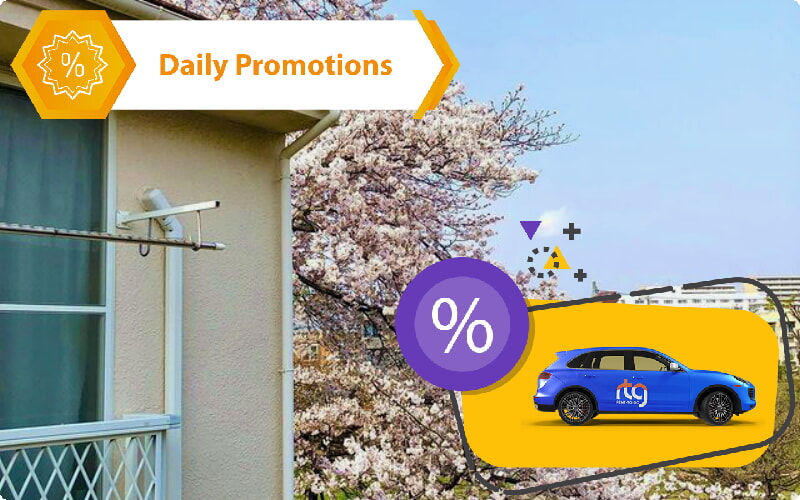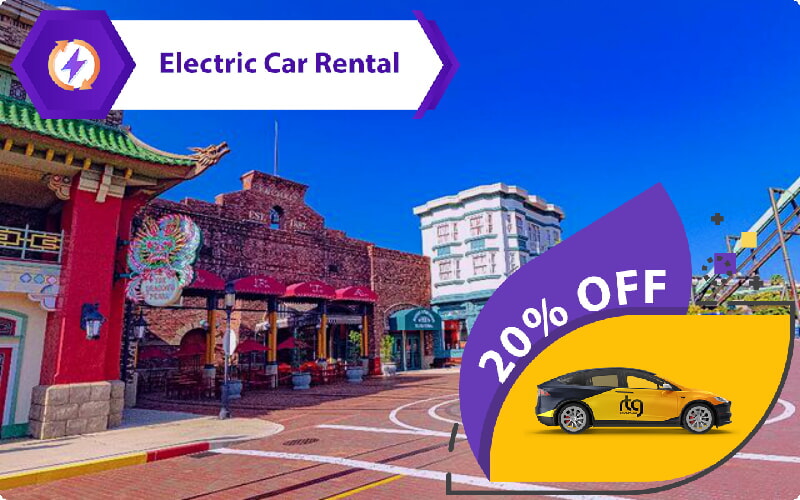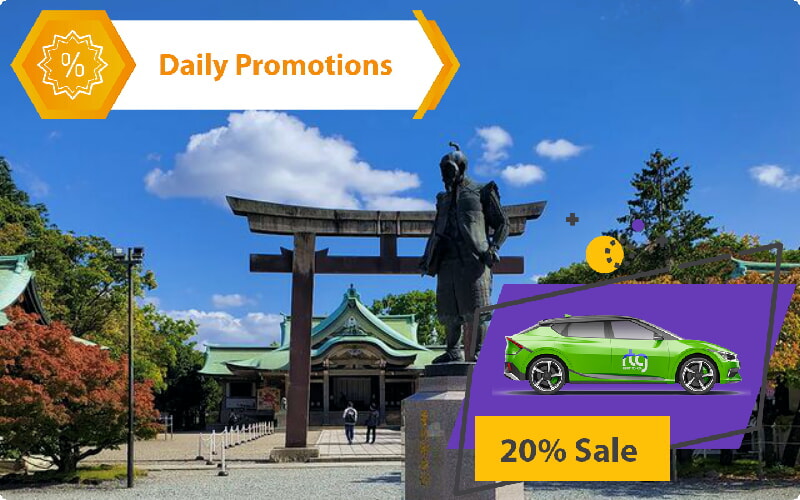 Up to
-35%
Up to
-35%
Osaka, a bustling metropolis in Japan, offers a unique blend of modernity and tradition. If you're planning to explore this vibrant city and its surroundings, hiring a car can be a convenient option. Here’s everything you need to know about car hire in Osaka.
While Osaka has an excellent public transportation system, hiring a car provides flexibility and convenience, especially if you plan to visit attractions outside the city. With a car, you can easily explore nearby destinations like Kyoto, Nara, and Kobe at your own pace.
Before you can hire a car in Osaka, ensure you meet the following requirements:
Osaka has numerous car rental companies, both international and local. Some popular options include:
Driving in Osaka can be straightforward if you keep these tips in mind:
By understanding these key points, you can enjoy a smooth and enjoyable car hire experience in Osaka, making your trip even more memorable.

Osaka offers a variety of electric cars for rent, catering to both tourists and locals who are looking for an eco-friendly way to explore the city. Here are some popular electric car models available for rent in Osaka, along with their average daily rental rates:
These rates provide a general idea of what to expect when renting an electric car in Osaka. Prices may vary based on the rental company, duration, and season. Always check with the rental agency for the most accurate and up-to-date rates.




For travelers looking to explore beyond Osaka, one-way car rental options provide a convenient solution. Many rental companies in Osaka offer the flexibility to pick up a car in the city and return it in another location, such as Kyoto, Tokyo, or Hiroshima. This service is ideal for those planning a road trip across Japan without the need to circle back to the starting point.
One-way rental fees can vary depending on the distance and the rental company. On average, you can expect to pay an additional fee ranging from €50 to €150 for returning the car in a different city. For example, renting a compact car in Osaka and returning it in Kyoto might incur a one-way fee of around €60, while returning it in Tokyo could cost approximately €120. It's advisable to check with the rental company for specific rates and any potential discounts for longer rental periods.

To save on car rentals, it's wise to book early—especially in tourist-heavy areas where high demand can lead to increased prices. Early booking ensures you get a lower rate and the vehicle you prefer.
Many rental agencies in Osaka offer "early-bird" discounts, potentially cutting costs by 20% to 30%. This is particularly useful during busy travel seasons when prices rise.
Early booking not only saves money but also allows you to compare prices more effectively. Flexibility in travel dates can lead to additional savings.
Visit our website, r-tg.com, to find the best rates. We compile offers from various providers and often feature exclusive discounts, making it easier to find the best deal in Osaka.
Scouring multiple sources for car rental rates is one of the best strategies to secure a cost-effective deal. Different rental companies have varying price structures, and the cost can differ widely even for identical vehicle categories.
Let's say you're interested in a compact vehicle like a VW Polo. While you may initially lean toward established brands like sixt or budget, don't overlook smaller, local agencies. These lesser-known providers may offer enticing rates to lure customers away from larger competitors.
For example, renting a VW Polo from sixt could set you back €25 per day, with basic insurance included. In contrast, budget might charge €78 per day for the same car, but with a limited mileage allowance. A more thorough search could reveal a local vendor offering the VW Polo at a daily rate of just €24, with unlimited mileage to boot.
Using discount codes can significantly reduce your car rental costs in Osaka, offering you the chance to upgrade your vehicle class, extend your rental period, or simply save money. These promotional codes or coupons are not just for the savvy coupon-clipper; they are a mainstream and widely accepted practice in the car rental industry.
There is a wide array of discounts you might be eligible for. For instance, AAA members often enjoy reduced rates or additional perks like a free additional driver. Military personnel and their families can also benefit from special rates. Even holding a particular type of credit card could make you eligible for specific discounts or additional coverage. Always check what types of discounts you might qualify for, as they can stack up and result in substantial savings.
Discount codes can be found on a variety of platforms, including:
While discount codes can offer significant savings, they may come with specific terms and conditions, such as blackout dates or limited vehicle classes. Always read the fine print to ensure the discount applies to your specific rental needs.
Prepaid fuel may seem convenient, but it often comes at a higher cost. Filling up the tank yourself usually results in savings.
Opting for prepaid fuel means you pay for a full tank at the rental company's rates, which are usually marked up. Unused fuel is generally non-refundable.
If you won't drive much, prepaid fuel is less economical as you may return the car with unused gas.
Skipping prepaid fuel saves money but requires planning. Balance the savings against your time to decide if it's worth it.
In short, while prepaid fuel is convenient, self-refueling is often cheaper. A little planning can maximize your savings.
Selecting an economy car can significantly reduce both your rental and fuel expenses, a key advantage for long trips or in high-cost fuel areas.
Lower rental rates and better fuel efficiency make economy cars a smart choice, particularly in crowded or space-limited areas.
An electric vehicle (EV) might have a higher rental rate but can offer fuel cost savings and is eco-friendly.
Renting an EV like the Tesla Model S could essentially eliminate fuel costs with free charging stations.
In some places, EVs have access to carpool lanes, adding time-saving value.
To wrap it up, economy or electric cars offer a budget-friendly, eco-conscious choice. Always weigh rental and likely fuel expenses to make the best decision for your trip.
Many travel websites provide package deals that encompass flights, hotels, and car rentals. By combining these services, you can frequently secure substantial savings.
Choosing the least expensive car might seem counterintuitive, but it could result in a free upgrade.
Rental companies often run out of economy cars. If you book one, you might receive a free upgrade to a larger car.
While it's a gamble, you could win big, especially during peak seasons. In the worst case, you get an economical ride.
Before choosing the rental company's insurance, review your own auto insurance policy to determine if it covers rentals. If it does, you can avoid the extra cost.
Car rental agencies in Osaka often offer special promotional rates and discounts, especially during holiday periods or low-demand seasons. To stay updated on these limited-time promotions, consider subscribing to their newsletters or regularly checking their websites. You can also follow them on social media platforms where they may announce exclusive deals.
Incorporating these strategies into your travel planning can significantly improve your chances of securing a great deal on your car rental. Being an informed and savvy consumer in this vibrant city can make a substantial difference in managing your travel budget effectively.
When it comes to car rentals in Osaka, one aspect that often gets overlooked is the mileage limit imposed by rental companies. Failing to consider this could result in unexpected fees, making it vital to understand the mileage policy before you hit the road.
Car rental companies may offer different types of mileage policies, such as:
The fees for exceeding mileage limits can be substantial. For example, you could be charged an additional $0.25 to $0.75 per km over the limit. If you exceed by 100 kilometers, that's an extra $25 to $75 you'll need to pay.
Always ask about mileage policies when picking up the car. Sometimes you can negotiate a higher mileage limit for a small additional fee, which could be cheaper than paying per mile overage fees later on.
By being vigilant about mileage limits when renting a car in Osaka, you can avoid unwelcome surprises on your bill and enjoy a budget-friendly, stress-free experience.